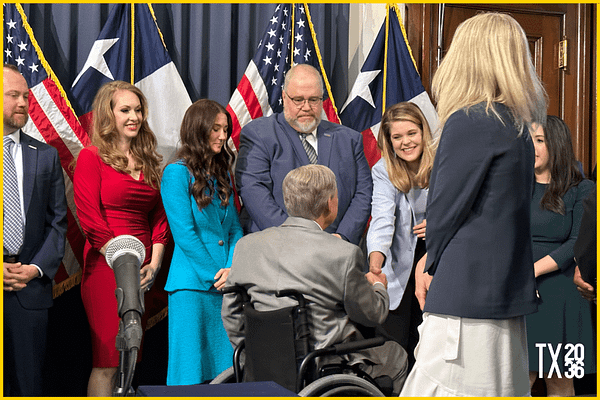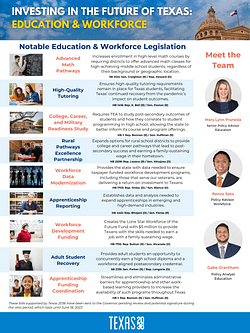Education & workforce: New legislation to know about
This is a preview of our Texas 2036 newsletter that highlights Texas 2036-endorsed education and workforce legislation from the 88th Legislature. To receive this weekly look at our work, sign up here.
Investing in the Future of Texas: Education and Workforce 🛠

Taking action: From pioneering reforms in community college finance to the strategic expansion of apprenticeship programs and further alignment of education-to-workforce outcomes, the Legislature made a tangible commitment to the future of Texas during the regular session.
Where we stood: Texas 2036 has been an instrumental partner in this endeavor, leveraging data-driven, evidence-based policies to improve student academic and workforce outcomes.
- Combined with billions of dollars in generational investments in education and workforce issues, these efforts have culminated in a dozen landmark achievements this session.
Dive deeper: Each bill serves as a stepping stone in Texas’ journey toward every Texan having the opportunity to earn a family-sustaining wage.
👉 Check out the highlights below and find more results from the 2023 legislative session on our website.
Reforming Community College Finance 💰
Big moves: Texas will be at the forefront of higher education reform with the passage of a comprehensive community college finance overhaul.
- Paired with an additional $691 million investment, this bill will help more Texans earn the credentials—degrees, workforce-aligned certifications, licenses, badges and apprenticeships—needed for good-paying, in-demand jobs.
📊 Over 70% of jobs in Texas will require a postsecondary credential by 2036.
- Governor Abbott signed House Bill 8 by Rep. VanDeaver, R-New Boston, and Sen. Creighton, R-Conroe, into law last week.
 It’s Your Turn, Texas 🫵
It’s Your Turn, Texas 🫵
With all these new laws moving forward, we want to hear what they mean to you.
Take our short survey and share your feedback on education and workforce policies.
Expanding High-Quality Curriculum 📚
Progress ahead: High-quality instructional materials have a high return-on-investment in improving student outcomes, even more so than lowering class size.
- A $500 million investment will offer more of these materials to schools and teachers, assisting educators with lesson planning while ensuring more rigorous, grade-level instruction in our classrooms.
📊 Only 19% of elementary reading curriculum taught in Texas classrooms is on or above grade level.
- On Monday, the Governor signed HB 1605 by Rep. Buckley, R-Killeen, and Sen. Creighton into law. Senior Policy Advisor Mary Lynn Pruneda was invited to join the signing ceremony for her efforts supporting the bill.
▶️ Learn more: Mary Lynn discusses how the 88th Legislature prioritized high-quality instructional materials and curriculum.

Defending Accountability and Assessments ✏️
Why this matters: Assessment and accountability remain primary tools for ensuring that students of all races, incomes and zip codes have equitable access to a first-rate education.
- Families, school leaders and policymakers deserve strong assessment and accountability systems that prioritize student outcomes, readiness and transparency.
📊 87% of Texas districts earned an A or B in the accountability system, but almost half of students aren’t on grade level in reading while 60% aren’t on grade level in math.
- During the regular session, no bills undermining this system reached the Governor.
▶️ Explore more: Policy Analyst Gabe Grantham talks about the top legislative victories in education, particularly student readiness.
 More Education & Workforce Legislation 🧑🏭
More Education & Workforce Legislation 🧑🏭
Other notable Texas 2036-supported legislation will:
✔️ Increase enrollment in advanced math courses,
✔️ Maintain high-quality tutoring requirements,
✔️ Establish data needed to expand apprenticeships in high-demand industries, and more!
👉 Want to keep up with more education legislation? The new House Select Committee on Educational Opportunity & Enrichment will soon begin its work considering a range of education issues.
Texans Are Talking 📢
We asked: If you had an extra dollar to spend in the state budget, where would you spend it?
You answered:
▪️ “I would spend way more money towards water … funding desalination plants and water research.”
